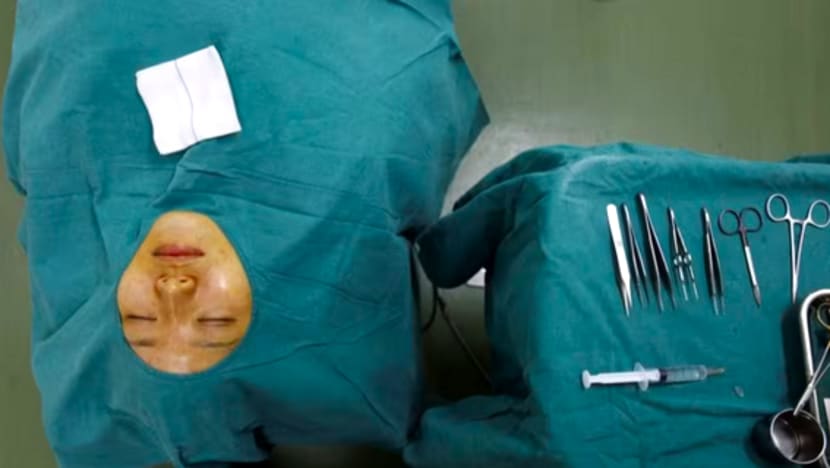More Singaporeans under 30 going for plastic surgery; number of botched jobs also on the rise
As such beauty enhancement procedures become more common, doctors have raised concerns about the possibility of addiction.


This audio is generated by an AI tool.
SINGAPORE: Five years ago, Georgina Poh wanted a new smile.
She sought out an aesthetic clinic she considered “safe” – it was well known among social media personalities.
But the recovery after turning up the corners of her lips was tougher than she expected.
“I could not open my mouth for weeks. There were bruises all over, and my face was super swollen,” said the 31-year-old.
Today, the scars still remain. But because she signed a waiver prior to the procedure, she was unable to engage the help of lawyers.
As more young people go under the knife in the pursuit of physical enhancement, the number of botched jobs overall has also climbed in recent years, said lawyers and doctors.
However, like in Ms Poh’s case, some do not get reported and even fewer go to court. In fact, most cases that involve lawyers are privately settled with clinics.
This is because it is not easy to prove if a doctor has failed to perform duties up to standard, noted law practitioners who handle disputes over such medical treatment.
Mr R Shankar, managing director of Advox Law, said there is a need to engage an expert – usually from overseas – to go through clinical notes and determine if a doctor has been negligent, before clients can build up a case.
“I’ve seen greater awareness by the general public that they have their rights to be protected … and more are turning to legal advice,” he said.
“Not all treatments go well. Some lead to severe consequences like blindness. Do your due diligence. Go to a proper registered practitioner.”
He added that authorities have passed additional safeguards such as putting in place guidelines and requiring further licensing for more invasive treatment.
Lawyer Jacqueline Chua said: "Medical negligence can occur in a variety of ways – there could be breaches of the duty of care in respect of the diagnosis, advice or treatment, or consent taking."
For aesthetic clinics, a breach of duties could arise when they improperly delegate procedures to those who are not trained or offer treatments that are not covered under guidelines, she added.
UNLAWFUL PROCEDURES
Between 2022 and 2024, the Ministry of Health (MOH) investigated about 90 cases involving unauthorised people carrying out acts of a medical practitioner, practising dentistry, or both – a 50 per cent increase from the previous two years.
Such unlawful procedures can be carried out in various non-medical setting locations such as residences, shops, hotel rooms and other premises.
Some plastic surgeons have reported that one in 10 botched jobs come from overseas or unregistered practitioners.
But even for veteran consultants, some said they feel pressured to keep up with the field’s rapidly evolving nature and adopt new procedures and technologies, especially as clients often refer to what they see on social media.
“There's a lot of new treatments that are constantly coming up. It's a very competitive field,” said consultant dermatologist Dr Evelyn Tay, founder of Lumine Dermatology & Laser Clinic.
“Sometimes, it's good to just pull back a little bit and let the treatment launch in the market first. See what the general feedback is like, get a bit more experience and the feel of the product before launching it in your own clinic.”
PATIENTS GETTING YOUNGER
Plastic surgeons in Singapore are reporting a 30 per cent jump in demand for cosmetic works compared to a year ago, driven by younger clients.
They said that in the past, clients were typically above the age of 40 as they sought ways to reduce ageing features and look more youthful.
But these days, doctors are seeing more under 30 at consultations.
The more common procedures in Singapore include upper and lower eyelid surgeries, nose reshaping and body contouring.
"They believe (such procedures) will help with their self-confidence and self-esteem,” said Dr Rachel Ho, medical director of LA Clinic, adding that social media plays a huge part.
“We’re seeing a lot of people glamourising cosmetic work or openly sharing their cosmetic treatments,” she noted.
“That has normalised certain perceptions that used to have a stigma around them. That has sort of urged people to seek intervention or treatment of certain conditions.”
Doctors say the actual number of people getting plastic surgery could be more, especially as it is easy to travel abroad to get beauty at a budget.
One of the most popular procedures is rhinoplasty, or nose reshaping. It costs between S$5,000 (US$3,900) and S$25,000 in Singapore but in South Korea, it can be as low as S$2,900.
“Singapore is one of the costliest countries in the world to live in. As doctors, we face cost pressures as well, so unfortunately, that may sometimes translate to the patient,” said Dr Adrian Ooi, medical director of Polaris Plastic & Reconstructive Surgery.
CONCERNS ABOUT ADDICTION
As such enhancement procedures become more common, doctors have raised concerns about the possibility of addiction to plastic surgery.
Currently, doctors rely on a patient’s motivations and medical history to make that call as there are no official guidelines for that assessment.
Some have turned down patients when they spot underlying psychological conditions, such as those who obsessively worry about perceived flaws in their appearance.
"You want to prevent a younger population from being addicted to plastic surgery,” said Dr Janna Joethy, a senior consultant at Nassim Plastic Surgery.
“The only way to do that is by proper education – tell them these are the risks involved … set the boundaries right from the start … and if need be, further evaluation by another healthcare worker,” she said.
According to Singapore Medical Council guidelines, doctors are encouraged to take reasonable care to ensure that patients do not have psychological or psychiatric illnesses involving self and body image before providing aesthetic procedures to them.
They must also not exploit patients’ vulnerabilities and insecurities about self-esteem and perception of body image.
When advertising or advising on aesthetic procedures, doctors must recognise patients’ expectations and give objective and comprehensive information to patients about the procedures as well as what outcomes may be reasonably expected.
They also must not feature “before-and-after” or only “after” visuals in advertisements, only during consultation and with proper context.
Ultimately, experts said the safest move for patients is to do their homework and be sure of their choice before committing to any procedure.
Deejay and online personality Jade Rasif, who often shares her experiences with plastic surgery on social media, echoed the sentiment.
She was just 19 when she first went for a breast enlargement procedure in Thailand. She has since gone through other treatment including lip fillers and botox.
While she is happy with most of the procedures, she regrets one that changed the aesthetics of her nose.
“My father is Middle Eastern and Slavic, and he had this really amazing big nose. Now, when I look at old pictures of myself, I feel kind of sad that I no longer have that ethnic feature. I wish I held on to my ethnic features and that I didn't dislike it so much (when I was younger),” she told CNA.
When asked if she had any advice for those contemplating plastic surgery, she said it should not be seen as a “quick fix” for body image issues, and should be properly thought out before going under the knife.
“When people get surgery, especially at a young age, including myself, you are sort of trying to make yourself fit an ideal, and that ideal is somebody else's ideal,” she said.
“So, when you're thinking of cost-cutting or thinking of getting procedures, please think, 10 to 20 years (from now), are you going to be happy with it?”




















